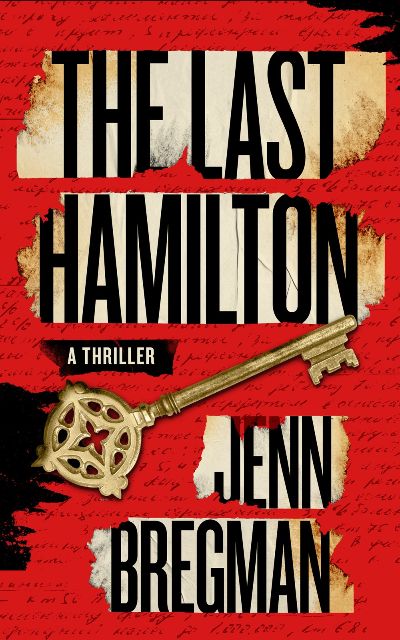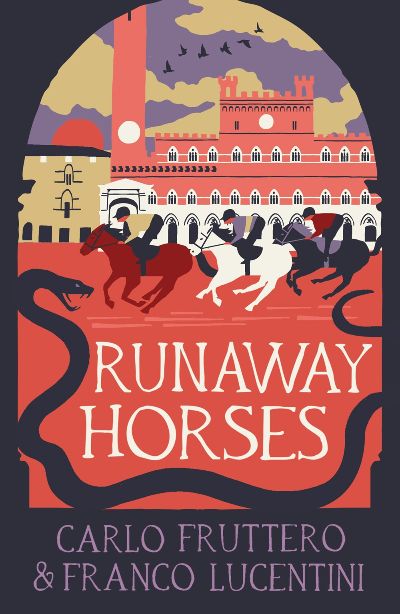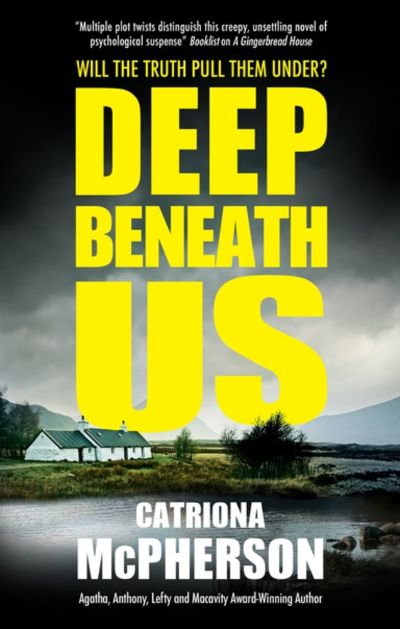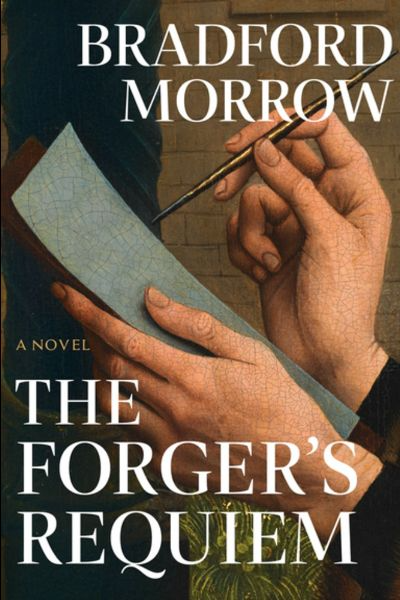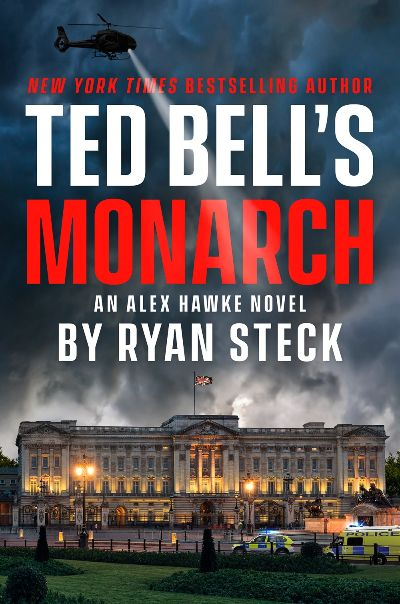Three women, who couldn’t be more different, come together over a man—known as Zander, Zachary, Xavier and more—whom they hate a great deal and love, perhaps, just a little. Marina is a former chef, now a full-time mom, who’s recently divorced and quite broke, but is enjoying rediscovering love with Xavier. Lilah is a withdrawn librarian who wins the lottery—literally. With funds pouring into her account, and falling in love with a man who is now her fiancé, Xavier, life couldn’t get any better. Then there’s Opal, the oldest of the trinity and a well-known health guru whose history with Xavier—confidence man, liar, thief, and lover—extends back the farthest. How the three women come together, and slowly learn to trust one another, is an absolute delight. But what to do with Xavier, currently a hostage in Marina’s basement, is even more of a laugh riot. Until it isn’t, and the book takes a very dark turn indeed. For all who loved Cohen’s Bad Men and Robert Thorogood’s The Marlow Club Murder.
Thrillers
Bregman takes the history of Alexander Hamilton and his legacy, mixes it with a modern-day conspiracy, and delivers a fun and engaging read. Elizabeth Walker is the last heir of the Hamilton family line, and when she passes away, that’s it. During research, Elizabeth uncovers a key created during Hamilton’s life. On her way home after, she’s followed, and in the New York subway, rather than have the key taken, Elizabeth texts her best friend, Sarah Brockman, to contact Elizabeth’s husband, Ralph. Then she jumps in front of an oncoming train. Sarah, devastated by Elizabeth’s death, receives a box of documents her friend sent over before her death. Working with Ralph, they are shocked to learn that a secret society established by Hamilton still exists today. The bedrock of this society has kept the United States strong all these years. Still, sinister forces want to destroy the States, and they have plans to use Hamilton’s legacy to cause economic chaos by eliminating the foundation of the American dollar. Bregman has crafted a page-turning thriller of history and the financial world that will have readers wondering if any of the story could be real. Steve Berry and Dan Brown fans will want to add this to their reading list.
And now for something completely different. Carlo Fruttero and Franco Lucentini were well-known Italian authors who co-authored several mysteries, throughout the 1980s and ‘90s, under their surnames of Fruttero & Lucentini. Their best-known works are The Lover of No Fixed Abode, set in Venice, and The Sunday Woman, which was made into a film starring Marcello Mastroianni and Jacqueline Bisset. Runaway Horses takes place in Siena during the Palio of Siena, the biannual horse race that the Sienese have been celebrating since the 13th century. It features lawyer Enzo Maggione and his wife, Valeria, who are traveling from their home in Milan to Siena, visiting Valeria’s brother along the way. But the two never make it to the farm; instead, they encounter a violent storm and take refuge in a nearby, sprawling estate. Here they find a most idiosyncratic group, including Puddu, the best known of the Palio’s jockeys. Fruttero and Lucentini take the reader deep into the arcane practices of the Palio, which are full of plots and counterplots, while Enzo and Valeria discover their attraction not only to each other but to other residents on the estate as well. Readers with an interest in Siena may enjoy the exhibit Siena: The Rise of Painting 1300-1350, which is currently on display at the Metropolitan Museum and will travel to Britain’s National Gallery in spring 2025.
It’s dark. It’s humorous. And everything about it is completely unexpected. Dolores dela Cruz has been on the lookout for a serial killer, and Jake Ripper fits the bill. A temp in her office, Jake is charming, handsome, and in possession of a pair of classic “strangler gloves.” What more can you ask for? Jake, meanwhile, is smitten with his mysterious colleague, from her severe wardrobe to the abuse she occasionally dumps on him. Slowly, the relationship between the two morphs into a morbidly intense but weirdly romantic obsession. The dialogue—a good part of the pleasure this book offers—runs from full-on snark to flirtatious banter. And while there are plenty of those head-swiveling moments suspense readers love, more shocking is the tenderness that grows between the two. Are we dealing with real murderers here, or do some serial killers just want to have a little fun? Weird enough to appeal to a broad swath of crime fiction readers.
Arizona’s beloved father, the only one besides her mother and precious dog, Mojo, who really got her, died recently in a motorcycle accident. He was on a solo ride while mom and Arizona stayed in the trailer they travel in while the 17-year-old is being homeschooled. Mom and Arizona—who seems to be on the autism spectrum—are back in Bodie Historic Park, the California ghost town near where the accident took place, planning to spread Dad’s ashes. Arizona is barely holding things together as it is, she misses her father so viscerally, but things spiral out of control even further when her mom goes missing. It’s hard for Arizona to trust others at the best of times. But when it’s clear that harm may have come to her mom, a realistic and touching new friendship is a chance for readers to watch the girl force herself to open up to another. This is an inwardly focused book, with debut novelist Merson taking us inside Arizona’s sharp mind and exploring her feelings at having to depend on others while pushing relentlessly to uncover what happened to her family. A sparkling debut; readers, including young adults, will definitely want more from this new author.
A lean, wonderfully written story of a husband and wife, serial killers who target only bad men who deserve it: primarily rapists and sexual abusers. While the two couldn’t come from more dissimilar backgrounds—British Hazel has dragged herself out of a childhood of poverty and neglect and is now a successful painter, while American Fox, a finance guy, descends from one of the USA’s wealthiest, most prominent families. But it was their joint passion for murder that brought them—and keeps them—together. Until, that is, in this version of Mr. and Mrs. Smith, Hazel discovers she is pregnant, and off to the London suburbs they go. At Fox’s insistence, they agree to no more murders until baby Bibi is 21—how can they risk incarceration, which would leave Bibi an orphan? But Hazel can barely tolerate motherhood, never mind forgoing murders, and it’s thanks to her one “mom friend,” Jenny, that she is able to keep it together. Until she suspects Fox of harboring secrets, she develops a few herself, and Jenny turns out to be, of all things, a cop. The pace is just perfect, the characters alternately funny and dark, and the head-spins relentless.
Tabitha is compelled by the spiteful actions of her ex-husband to move back to her childhood home. This is not a cozy, safe space as one might hope. It is a sort of compound: two schoolhouses on different sides of a reservoir, one occupied by her family, the other by her uncle’s family. In the past, four cousins, Tabitha the youngest, ran and played like a pack. But her mother is an unstable artist, her father and uncle killed themselves, and her sister and cousin married each other at age 16. Now, cousin Davey purportedly dies by suicide as well, leaving his property to Tabitha. But is that what really happened? Davey’s two cronies, along with three smart teens, use skills learned from TV crime dramas and DNA analysis to get to the bottom of it all. The characters are captivating, the atmosphere is dark and dour, and the wretched weather contributes to the overall tone of the book. The novel is set in Scotland and the use of Scottish dialect and expressions is sometimes daunting, but never gets in the way of the telling. To say that the plot here is a tangled mess may be an understatement, but the untangling is a treat.
Literary forger Henry Slader unexpectedly finds himself in an Edgar Allan Poe story when he, concussed and bruised, awakens in a shallow grave. Shakily digging himself out, Slader gradually remembers that Will, his old rival, and his daughter, Nicole, assaulted him with a shovel after a deal involving the forgery of a rare Poe book went bad. Determined to avenge himself on Will (20 years of bad blood between the two men includes a violent attack that landed Slader in prison) and needing to raise cash, Slader blackmails Nicole, a budding artist and a talented forger, threatening to expose her father’s role in the unsolved murder of her uncle. After forging inscriptions by such authors as Ernest Hemingway and Gertrude Stein, Nicole is tasked with creating a cache of letters by Frankenstein author Mary Shelley, a valuable trove that will enable Slader to retire permanently from the forgery business. But even the best-laid plans can go astray. A shocking climax at Mary Shelley’s grave in Bournemouth, England, leads a stunned Nicole to wonder what “drives people to such lunacy.” Toggling between Slader’s third-person perspective and Nicole’s first-person narrative, Morrow offers fascinating insights into the literary forger’s art. Although this is the concluding volume to the author’s trilogy (The Forgers, The Forger’s Daughter), it can be read as a dark, twisty standalone thanks to plenty of backstory.
Ted Bell passed away last year, and Ryan Steck (Out for Blood) has continued the series with this terrific entry into the world of Alex Hawke. Hawke wants nothing more than to settle down with his fiancée and son, but a crisis intervenes, and he must become the ruthless spy England needs him to be. A referendum to split Scotland from the United Kingdom is upcoming, and King Charles III mysteriously vanishes while out on a hunt with his friends, baffling his security detail. Hawke and his allies have 72 hours to find the King—the monarchy and the entire United Kingdom will never be the same if they don’t. Of course, there is more in play than the King’s whereabouts, and failure means the toppling of the entire British government. Steck is the perfect author to continue Hawke’s adventures. He channels Ted Bell, creating a story that seems to come from Ted himself. The story is a terrific launch point for newcomers, as Steck brilliantly juggles the details from previous books while not making them seem repetitive. Fans of the series will love seeing their favorite characters back in action, while readers new and old will enjoy this mix of Clive Cussler and James Bond and be eager to see what Steck has in mind next for our hero.
Mailman Hank Davies lives in the small town of Bethlam, Nevada, and delivers to the same people every day. It’s predictable and consistent. One morning, he accidentally trips over a tree branch, and one of the envelopes opens, and he can see the letter inside. The page is blank. He secretly opens a couple more letters, which are also blank. When he talks to his wife, Iris, about the mystery, she shrugs it off and reminds him he needs to take better care of himself and not stress over trivial things. After Hank’s accident, his doctor warns him to take things easy. As Hank begins questioning his life and memories, a neighbor comes by in the middle of the night and says, “You can’t trust them. They mean you harm.” This cryptic message sends Hank on a perilous journey, questioning everything and everyone in his life. But if he learns the truth, it won’t set him free: It will destroy him. Bassoff weaves a tale that mixes Ira Levin with the best horror films, where you want to yell at the screen to warn a character of what is about to happen. This novel is an atypical chain, in which the more the story twists, the tighter the chain becomes instead of unwinding. Readers will not be able to put this book down until they learn the mystery behind the façade.


